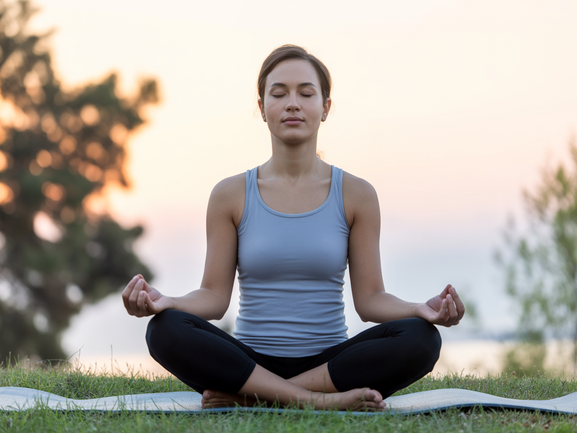Yoga Philosophy for Beginners: Your Meditation Support Guide
Have you ever wondered how ancient yoga philosophy can transform your meditation practice? If you’re seeking meditation support and feeling overwhelmed by where to start, you’re not alone. Many beginners find themselves lost in complex spiritual concepts, but the truth is that yoga’s philosophical foundations offer the perfect roadmap for developing a meaningful meditation practice.
Today, we’ll explore how yoga philosophy for beginners can provide the spiritual framework you need to deepen your meditation journey. Whether you’re completely new to these practices or looking to strengthen your existing routine, understanding these timeless principles will give you the confidence and clarity to move forward.
Understanding the Heart of Spiritual Yoga Practice
The word “yoga” literally means “union” – the connection between mind, body, and spirit. This ancient practice isn’t just about physical postures; it’s a comprehensive system designed to support your journey toward inner peace and self-awareness.
When we talk about spiritual yoga practice, we’re referring to the deeper aspects that extend far beyond the mat. These philosophical foundations create a solid base for meditation, offering practical wisdom that can transform how you approach your daily practice.
Moreover, yoga philosophy provides essential meditation support by giving you tools to understand and work with your mind. Instead of fighting against wandering thoughts or feeling frustrated with your progress, you’ll learn to approach meditation with patience, compassion, and realistic expectations.
The Eight Limbs: Your Complete Framework for Yoga Philosophy Meditation
The ancient sage Patanjali outlined eight limbs of yoga that serve as a complete guide for spiritual development. These limbs work together to create a balanced approach to yoga philosophy meditation:
Ethical Guidelines (Yamas and Niyamas)
The first two limbs focus on ethical conduct and personal observances. These aren’t rigid rules but gentle guidelines that help create the right mindset for meditation. For instance, practicing non-violence (ahimsa) toward yourself means being patient with your meditation progress rather than being self-critical.
Physical Preparation (Asana and Pranayama)
While physical postures and breathing practices prepare the body, they also calm the mind. Even simple breathing exercises can serve as powerful meditation support, helping you transition from daily stress into a peaceful state.
Mental Discipline (Pratyahara, Dharana, and Dhyana)
These advanced limbs teach you how to withdraw from external distractions, focus your attention, and ultimately achieve the meditative state. However, don’t worry about mastering these immediately – they develop naturally through consistent practice.
The beauty of this system is that it provides online yoga guidance principles you can apply anywhere, anytime. You don’t need special equipment or perfect conditions to begin integrating these concepts into your life.
How Yoga Philosophy Supports Your Daily Meditation
Understanding yoga spirituality basics can revolutionize your approach to meditation. Here’s how these ancient principles provide practical support:
Creating the Right Mindset
Yoga philosophy teaches us about the nature of the mind and why it tends to wander. This knowledge helps normalize the challenges you face during meditation, reducing frustration and self-judgment. Instead of thinking you’re “bad” at meditation, you’ll understand that a busy mind is simply the starting point, not a failure.
Building Sustainable Practice
The philosophical approach emphasizes gradual progress over perfection. This perspective provides crucial meditation support by encouraging consistency rather than intensity. You’ll learn that five minutes of daily practice is more valuable than one hour once a week.
Developing Discrimination (Viveka)
Yoga philosophy teaches you to distinguish between what serves your wellbeing and what doesn’t. This skill becomes invaluable during meditation, helping you recognize when you’re getting caught up in unproductive thought patterns.
Furthermore, these principles help you approach mindfulness meditation help with realistic expectations and sustainable habits that actually stick.
Practical Ways to Integrate Spiritual Principles
Ready to bring yoga philosophy meditation into your daily routine? Here are simple, practical approaches that require no previous experience:
Start with Intention Setting
Begin each meditation session by setting a simple intention. This doesn’t need to be profound – it could be as simple as “I choose to be present with whatever arises.” This practice connects your meditation to the yogic principle of sankalpa (conscious intention).
Practice Self-Compassion
When your mind wanders during meditation, respond with kindness rather than criticism. This embodies the yogic principle of ahimsa (non-violence) toward yourself and creates a supportive internal environment for growth.
Embrace the Process
Yoga philosophy emphasizes the journey over the destination. Apply this wisdom by celebrating small progress in your meditation practice. Notice when you catch your wandering mind more quickly, or when you feel slightly more peaceful after sitting.
These practices naturally provide the online yoga guidance structure you need while remaining flexible enough to fit into any lifestyle.
Building Your Personal Practice
Creating a sustainable spiritual yoga practice doesn’t require hours of daily commitment or perfect conditions. The key is finding an approach that resonates with your current life situation while staying connected to these deeper principles.
Consider starting with just 5-10 minutes daily, focusing on breath awareness while keeping these philosophical foundations in mind. As noted in our comprehensive guide about what Vitalizen.app offers, having proper guidance makes all the difference in developing a consistent practice.
Remember, the goal isn’t to achieve a perfect meditative state immediately. Instead, you’re cultivating a new relationship with your mind – one based on understanding, patience, and gradual development.
The Vitalizen.app platform was specifically designed to support beginners on this journey, offering guided meditations that incorporate these timeless philosophical principles in accessible, modern formats.
Frequently Asked Questions About Yoga Philosophy and Meditation
How does yoga philosophy help with meditation?
Yoga philosophy provides a structured framework for understanding the mind and meditation process. It teaches you that a wandering mind is normal, offers techniques for working with thoughts compassionately, and emphasizes gradual progress over perfection. This knowledge reduces frustration and provides practical tools for developing a sustainable meditation practice.
What are the spiritual aspects of yoga for beginners?
For beginners, the spiritual aspects include ethical guidelines

